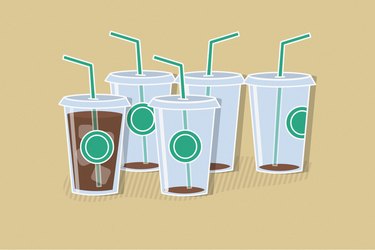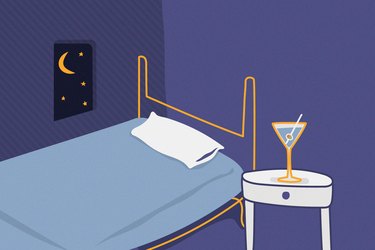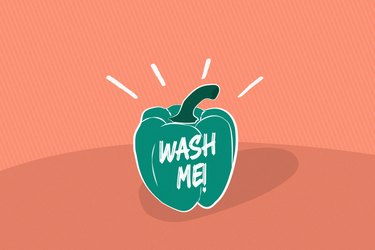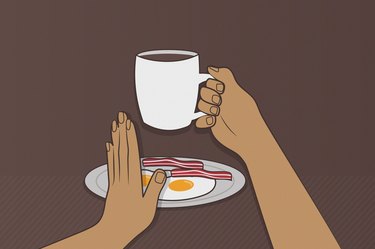
These days, caffeine-infused products are everywhere. You can score a buzz from caffeinated chewing gum, water, popcorn, hot sauce, lip balm — you name it.
Although the U.S. Food & Drug Administration (FDA) recommends limiting caffeine to 400 milligrams per day (that's four to five cups of coffee, FYI), consumption is on the rise. An April 2019 study in the American Journal of Preventive Medicine confirmed a significant uptick in energy drink intake, and the National Coffee Association reports that 62 percent of Americans have coffee every day, an increase of 5 percent since 2015.
Video of the Day
Whether coffee is your fn fn fn fn fn , you sip mugs of green tea all day long or you're prone to tossing back energy shots when you're working late-night, here's the scoop on whether it's a big deal to surpass the recommended max.
First, How Does Caffeine Affect the Body?
Caffeine is a stimulant that can either be naturally occurring (like in coffee beans or tea leaves) or synthetic (produced artificially and then added to foods and beverages, like energy drinks).
How Caffeine Perks You Up
"Caffeine affects adenosine, a neurochemical that mellows us out," says Jabraan Pasha, MD, physician of internal medicine at the University of Oklahoma College of Medicine. "It blocks the receptors that adenosine attaches to, so your body can't detect adenosine." By suppressing these sleep-inducing chemicals, we feel more awake.
"Keep in mind that people metabolize caffeine differently. One person can feel fine after drinking several cups of coffee, whereas someone else might feel jittery after just one cup."
"Caffeine also triggers your brain to release dopamine, a neurotransmitter that regulates pleasure and reward, and also has a role in alertness," says Nicole Avena, PhD, assistant professor of neuroscience at Mt. Sinai University and author of Why Diets Fail. "In addition to mental stimulation, caffeine slightly increases your heart rate and blood pressure, which is why you get a physical buzz from it."
According to the American Academy of Sleep Medicine, the effects of caffeine peak 30 to 60 minutes after consumption. And a December 2018 study in Risk Management and Healthcare Policy found that caffeine has a half-life of two to 10 hours, which means it takes your body up to 10 hours to digest half of the caffeine you've consumed.
"Keep in mind that people metabolize caffeine differently," Dr. Pasha says. "One person can feel fine after drinking several cups of coffee, whereas someone else might feel jittery after just one cup."
Healthy Benefits of Coffee and Tea
Most people get their daily caffeine from coffee and tea, and in moderation, these drinks are good for you. A November 2017 study in the BMJ confirmed that drinking coffee is linked to lower rates of heart disease, diabetes, stroke, kidney disease, liver disease, Parkinson's, dementia and cancer.
A December 2013 study in Current Pharmaceutical Design found that certain types of caffeinated tea are connected to lower rates of cancer, cardiovascular disease, diabetes and arthritis. It may also benefit your brain. In a May 2019 study in Molecules, older adults who drank tea were determined to have better cognitive function than their peers.
Researchers surmise these health boosts are thanks to high levels of protective antioxidants in coffee and tea. "The caffeine itself doesn't cause these benefits," Avena says. "You get the same positive outcome whether you drink regular coffee or decaf."
What Happens if You Have Too Much Caffeine?
The short answer is that it depends on the amount, how quickly it is consumed and how sensitive you are to caffeine.
"It might make you feel agitated, jittery or light-headed, or make your heart pound," Dr. Pasha says. "Still, for the most part, caffeine from coffee and tea is relatively safe, even in doses slightly above the recommendation."
A severe caffeine overdose, which the FDA estimates might result from rapid ingestion of about 1,200 milligrams of caffeine (that's about five energy shots or 12 cups of coffee), can cause vomiting, diarrhea, disorientation, seizures or a coma.
Tally Up Your Caffeine Load
According to a January 2014 study in Food and Chemical Toxicology, 85 percent of the U.S. population has at least one caffeinated beverage a day, with a mean of 165 milligrams a day. Use this chart to figure out your total. (Keep in mind that most coffee cups and drink bottles contain more than 8 ounces of liquid — for example, a Starbucks Venti is 20 ounces.)
Caffeine Sources
1 oz energy shot | 215 mg |
8 oz brewed coffee | 96 mg |
1 oz espresso | 64 mg |
8 oz black tea | 47 mg |
8 oz energy drink | 29 mg |
1 oz dark chocolate | 23 mg |
8 oz green tea | 28 mg |
8 oz cola | 22 mg |
8 oz bottled iced tea | 19 mg |
4 Times When You Need to Watch Your Caffeine Intake
1. You're Pregnant
If you have a bun in the oven, you've probably heard that you should take it easy with the caffeine. According to the American Pregnancy Association, caffeine can raise your blood pressure and heart rate, lead to dehydration and disrupt sleep patterns for you and baby — all of which are not recommended during pregnancy.
The American College of Obstetricians and Gynecologists deems less than 200 milligrams per day (two cups of coffee) to be safe during pregnancy, but some studies, including an August 2020 review in the BMJ, have linked caffeine during pregnancy to miscarriage, stillbirth, low birth weight, leukemia and childhood obesity.
2. You Have a Heart Condition
"If you have a condition that results in heart palpitations, such as cardiac arrhythmia, you may want to cut back on caffeine," Dr. Pasha says.
3. You Have Insomnia or Other Sleep Problems
"Some people are really sensitive to caffeine, and it can stick around in your body for eight hours or more," Dr. Pasha says, which can disrupt sleep.
Plus, if you're sleeping poorly at night, you might need more coffee or tea to feel awake in the morning — and before you know it, your caffeine intake can snowball.
4. You're Low on Iron
Finally, if you're taking an iron supplement, steer clear of caffeine an hour before and after popping your pill. "Caffeine blocks iron absorption," Dr. Pasha says.
Caffeine Dependence Is Real
If you've noticed your coffee or tea intake creeping up, then you may have built up a tolerance.
"When caffeine blocks your adenosine receptors, your body responds by creating more receptors to compensate," Dr. Pasha says. "As a result, you require more caffeine in order to feel alert." Now, you're sipping three or four cups when you used to have just two.
Not only do you start drinking more, but you feel crappy if you don't get your caffeine fix. "You might get a headache and feel sluggish or irritable," Avena says.
Luckily, it's reversible. "If you slowly cut back your caffeine intake over the course of a week or so, your body will reduce the number of adenosine receptors," Dr. Pasha says. It's like starting with a clean slate again.
"If you have a super busy period and drink more than the recommended amount of coffee for a couple of days, it is not the end of the world."
Want to Cut Back? Here’s How
Try these five ideas to reduce your caffeine intake without feeling blah.
1. Up Your B12 Intake
Vitamin B12 deficiency is common, affecting up to 15 percent of the population, according to the National Institutes of Health, and it can lead to fatigue. "If you are relying on caffeine to get yourself going, you might be deficient in B12," Avena says.
Because B12 is present in animal products (like fish, meat, poultry, eggs and dairy), vegans and vegetarians are at risk for deficiency. Same goes for older adults, who may not absorb B12 as easily.
"Eating foods rich in vitamin B12 or taking a supplement can make you feel like you have your energy back," Avena says. (She recommends Frunutta Dynamo B12 Blaze, a sublingual supplement that contains a small amount of caffeine along with B12.) With more pep in your step, you might not reach for the coffee pot as frequently.
Tip
B12 is a water-soluble vitamin, which means it's unlikely you'll overdose on it. Still, talk to your doctor before adding a supplement to your diet, to make sure it's right for you.
2. Change Your Routine
"Coffee drinking is very ritualistic — we become psychologically hooked on having it at a certain time and place," Avena says. "Look at how you can you alter your routine to disrupt the connection to your caffeine habit."
For example, if you always have a mug of coffee first thing every morning, instead drink a big glass of water right when you wake up and delay that initial cup of joe until after breakfast. If you like the feeling of having a warm beverage in hand when you sit at your computer, try switching to decaf or herbal tea.
3. Hit the Hay
Make sure you're getting the recommended seven to nine hours of sleep. "When you feel rested, you may find that you need less caffeine," Dr. Pasha says.
4. Work Out
"Exercising gives you a surge of endorphins and dopamine that will help you feel energized and can take the place of a caffeine rush," Dr. Pasha says.
5. Score Some Sunshine
Sunlight suppresses melatonin, a natural hormone that makes you feel sleepy. If you open all the shades when you wake up in the morning or take a walk around the block, your coffee cravings might not be as strong.
3 Tips for Safe Sipping
Even with moderate caffeine consumption, it's smart to follow these guidelines.
1. Skip Energy Drinks and Shots
Super high levels of caffeine in some energy-boosting beverages can cause your mood to yo-yo. You may have supercharged focus and pep at first, and then crash later.
"When you are hit with a bolus of caffeine, it raises your heart rate and increases your blood pressure, making your body work overtime," Avena says. "Instead, nurse a cup coffee; you will have a steady, lower dose of caffeine and won't experience those up and downs."
What's more: "Energy drinks tend to have a lot of added sugar to mask the chemical taste of synthetic caffeine," Avena says. According to the Harvard School of Public Health, a typical energy drink contains around 40 grams of sugar, as much as a can of soda. That blast of sweetness is not great for your body.
2. Avoid Caffeine After Lunch
A November 2013 study in the Journal of Clinical Sleep Medicine found that consuming 400 milligrams of caffeine six hours before bed reduced total sleep by more than one hour. Have your most highly caffeinated beverage early in the day, and then taper off.
3. Don’t Forget Sneaky Sources of Caffeine
An ounce of dark chocolate (70 to 85 percent cocoa) has about 23 milligrams of caffeine, while coffee ice cream can have anywhere from 5 to 45 milligrams per serving. Some medications also contain caffeine (for example, the headache medicine Excedrin has 65 milligrams of caffeine per tablet). Remember to count these sources toward your daily intake, and hold off on them in the late afternoon and evening to avoid interfering with sleep.
So, How Bad Is It Really to Have More Than the Daily Recommended Amount of Caffeine?
As long as you stick to coffee or tea (rather than sugary, additive-laden energy drinks), aren't experiencing any negative side effects and aren't pregnant, it's not that bad.
"As a physician, I wouldn't recommend it," Dr. Pasha says, "But at the end of the day, is it dangerous? No."
Also consider whether you are regularly going overboard or if it's an occasional thing.
"If you have a super busy period and drink more than the recommended amount of coffee for a couple of days, it is not the end of the world," Avena says. "On the other hand, if you are drinking too much every day, you might want to cut back. Honestly, though, there are worse things you could be overdoing it on!"
- Current Pharmaceutical Design: "Tea and Health: Studies in Humans"
- Molecules: "The Association between Green and Black Tea Consumption on Successful Aging: A Combined Analysis of the ATTICA and MEDiterranean ISlands (MEDIS) Epidemiological Studies"
- BMJ: "Coffee consumption and health: umbrella review of meta-analyses of multiple health outcomes"
- Mayo Clinic: "Caffeine content for coffee, tea, soda and more"
- FDA: "Spilling the Beans: How Much Caffeine is Too Much?"
- American Journal of Preventive Medicine: "Trends in Energy Drink Consumption Among U.S. Adolescents and Adults, 2003–2016"
- Food and Chemical Toxicology: "Beverage caffeine intakes in the U.S"
- National Coffee Association: "NCA releases Atlas of American Coffee"
- National Capitol Poison Center
- Harvard School of Public Health: "Energy Drinks"
- Risk Management and Healthcare Policy: "Effects of caffeine on sleep quality and daytime functioning"
- Journal of Clinical Sleep Medicine: "Caffeine Effects on Sleep Taken 0, 3, or 6 Hours before Going to Bed"
- BMJ: "Maternal caffeine consumption and pregnancy outcomes: a narrative review with implications for advice to mothers and mothers-to-be"
- American Pregnancy Association: "Caffeine During Pregnancy"
- National Institute of Health: "Vitamin B12"
- MyFoodData: "Nutrition Comparison of Dark Chocolate (45-59% Cocoa) vs Cola Soft Drink vs Tea Green Brewed Regular vs Black Tea (Brewed) vs Coffee vs Dark Chocolate (70-85% Cocoa)"
- Excedrin: "Excedrin Products: Ingredients & Dosage"
Is this an emergency? If you are experiencing serious medical symptoms, please see the National Library of Medicine’s list of signs you need emergency medical attention or call 911.



